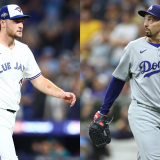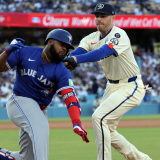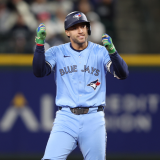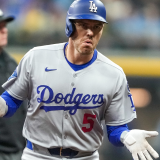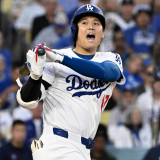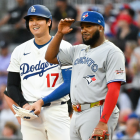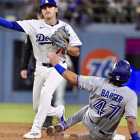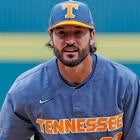How the Los Angeles Dodgers and Toronto Blue Jays have fared in the World Series before the 2025 Fall Classic
The Blue Jays have just two World Series titles to their name, while the Dodgers have racked up seven
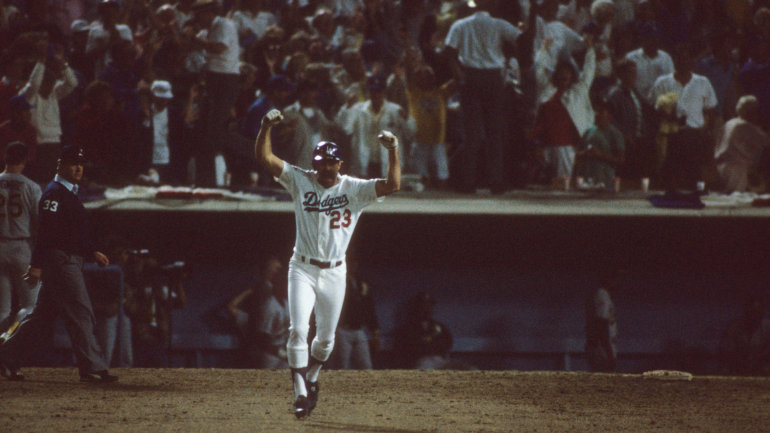
The Los Angeles Dodgers and Toronto Blue Jays are just a day away from kicking off the 2025 World Series. The Dodgers are looking to become Major League Baseball's first repeat champions in nearly a quarter century, having reached this point by knocking off the Cincinnati Reds, Philadelphia Phillies, and Milwaukee Brewers. The Blue Jays, conversely, entered the playoffs as the No. 1 seed in the American League field and have since defeated the New York Yankees and Seattle Mariners.
Before the Dodgers and Blue Jays can write the newest chapter of history, we here at CBS Sports thought it would be productive to revisit how they've fared in their past trips to the World Series.
Scroll with us, won't you?
Toronto Blue Jays
- Two World Series titles (1992, 1993)
- Three American League pennants (including 2025)
Of the two combatants, the Blue Jays have by far the least experience in World Series settings. This will represent just Toronto's third World Series trip in its 48th year of existence. Nonetheless, the Blue Jays to date have only experienced happiness in their Fall Classic appearances.
First, in 1992, the Blue Jays defeated the Atlanta Braves in six games. The series saw the Braves inflict some payback on Jack Morris, their conqueror the previous fall (then as a member of the Minnesota Twins). No matter, it was the Blue Jays who prevailed behind strong relief work and a timely Game 6 extra-base hit by Dave Winfield, who had four hits in his 21 other at-bats during the series.
"I'm the oldest man in the room, but I'm the happiest man in the room," Winfield would tell reporters afterward. "I didn't do a whole lot, but I did at the right time."
The series ended in dramatic fashion, with Braves outfielder Otis Nixon dragging a bunt with two outs and the tying run on third base. Blue Jays pitcher Mike Timlin was able to field the ball in time and fire it to first baseman Joe Carter with about a step to spare.
Carter played a role in the ending of the 1993 World Series, too. This time, the Blue Jays defeated the Philadelphia Phillies in six games when Carter launched a walk-off three-run home run against Mitch Williams. Even now, Carter's home run is just the second walk-off, title-winning blast in World Series history, with the other belonging to Bill Mazeroski back in 1960.
Carter, inducted into the Canadian Baseball Hall of Fame in 2003, said of the above moment: "They haven't made that word up yet to describe this feeling."
Los Angeles Dodgers
- Seven World Series titles (1959, 1963, 1965, 1981, 1988, 2020, 2024)
- 14 National League pennants (including 2025)
Since relocating from Brooklyn to Los Angeles ahead of the 1958 season, the Dodgers have averaged a World Series appearance better than every five years. That's an impressive statistic when you consider the total includes a nearly 30-year-long drought after their 1988 World Series win. Credit that in part to how the Dodgers have served as one of MLB's main characters over the past decade, to the extent that this will mark their fifth World Series appearance in the last nine years.
The Dodgers didn't take long to settle into their new surroundings, reaching and winning the World Series in just their second season in California by topping the Chicago White Sox in six games. That series, even now, may be best remembered for the larger, industry-wide significance than anything that happened on the field. Not only was it the first World Series to be played on the west coast, it was the best-attended World Series in history, with Game 5 alone drawing more than 92,000 fans at the Los Angeles Memorial Coliseum.
The Dodgers would reach three more World Series during the '60s: winning in '63 and '65 before losing in '66. Lefty Sandy Koufax threw two complete games (including a 15-strikeout performance in Game 1) as part of a sweep versus the New York Yankees in 1963. Koufax would become the first player in MLB history to win the regular season and World Series MVP awards in the same year. Koufax would again win Series MVP and dominate headlines in '65, first by sitting out Game 1 in observance of Yom Kippur and then by firing shutouts against the Minnesota Twins in Games 5 and 7. The Dodgers offense would forget to pack their bats for the '66 against the Baltimore Orioles, suffering shutouts in Games 2 through 4 as part of a sweep.
The Dodgers would again make three World Series appearances during the '70s, though they fell short of capturing another title by losing to the Oakland Athletics in '74 in the first all-California matchup; the Yankees in '77 (featuring Reggie Jackson's three-homer output in the decisive Game 6); and then again to the Yankees in '78. Fear not, the Dodgers would avenge those losses by defeating the Yankees in '81 and the A's in '88 -- you may know of that series for no other reason than Kirk Gibson's iconic home run in Game 1.
After 1988, the Dodgers would not make another World Series appearance until 2017, instead enduring an at-times embarrassing stretch of mediocrity. The franchise's fortunes started to change when Mark Walter purchased the franchise from Frank McCourt, later installing Andrew Friedman (the architect of the Tampa Bay Rays) as his top baseball operations executive.
In the years since, the Dodgers have become a staple of October, winning 12 of the last 13 division titles. They made it back to the World Series in 2017, losing against the Houston Astros in seven -- a loss the Dodgers took exception to in light of Houston's improper sign-stealing scheme -- and then lost in five games to the Boston Red Sox the following year. It wasn't until 2020, a World Series unlike any other because of the COVID-19 global pandemic, that the Dodgers slayed their postseason demons.
The Dodgers won a "regular" World Series last fall, defeating their old rival, the Yankees, in five games. That series was memorable, despite its abbreviated and one-sided result, because it represented Shohei Ohtani's first World Series appearance as well as an unforgettable walk-off grand slam by a hobbled Freddie Freeman -- a scene reminiscent of Gibson's home run in '88.
"I played the whole game though," Freeman joked to reporters after being met with the comparison.




